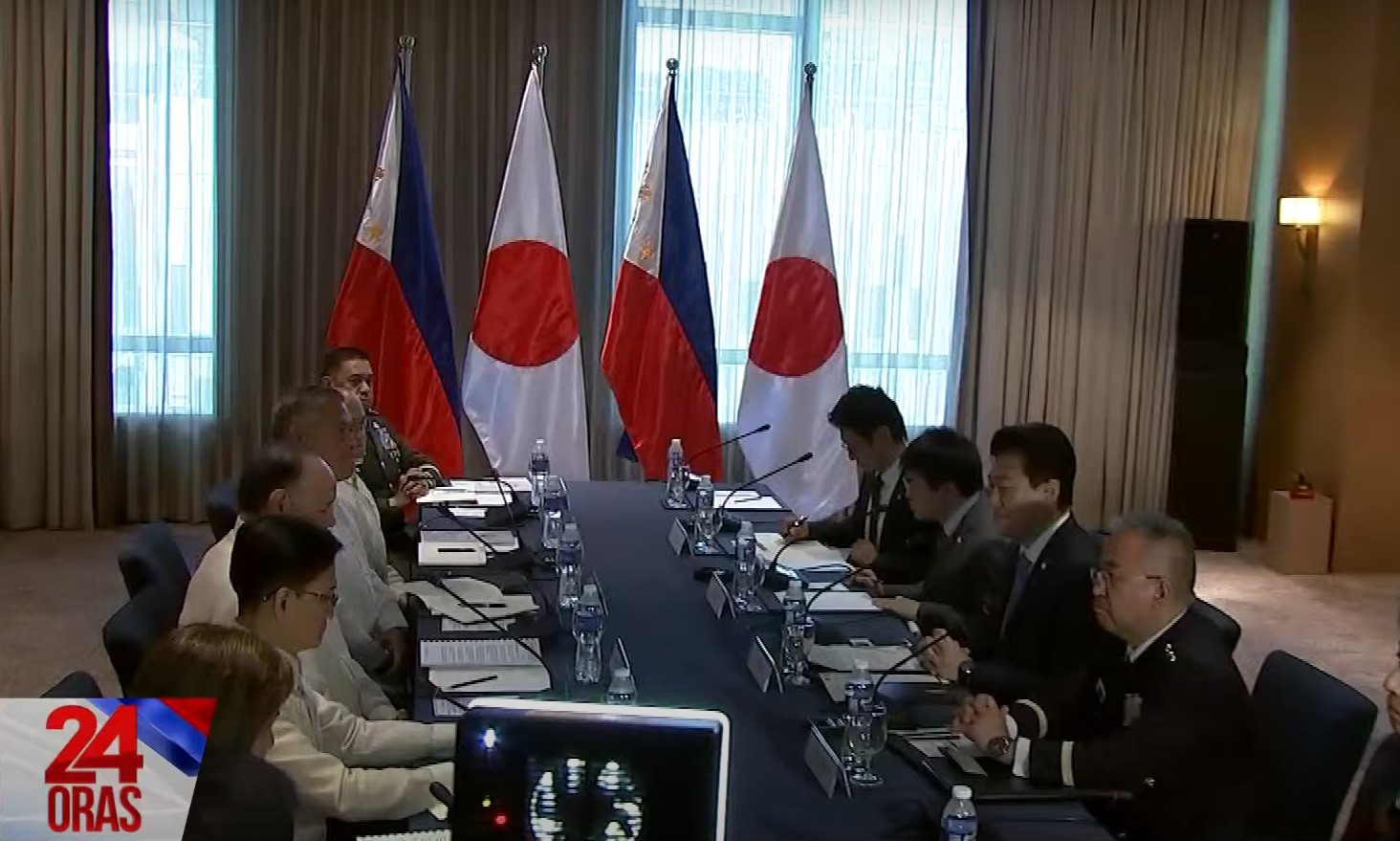PH, Japan call out China for 'dangerous acts' amid RAA signing

The The
Foreign and Defense ministers of the Philippines and Japan on Monday called out China's "dangerous and escalatory actions" in the South China Sea as both countries signed a key defense accord allowing the deployment of Japanese forces for joint drills in the country.
The Reciprocal Access Agreement with Manila will be Japan's third defense accord after those with the United Kingdom and Australia. It is akin to the Philippines' Visiting Forces Agreement with the United States.
Foreign Affairs Secretary Enrique Manalo and Defense Secretary Gilberto Teodoro held the 2 + 2 talks with Japanese counterparts, Foreign Minister Yoko Kamikawa and Japanese Defense Minister Minoru Kihara, in Manila.
The officials vowed to bolster ties and signed a key defense pact that would allow their soldiers to train in their respective countries.
In their statement, the ministers stressed "the need for the international community to speak out on the importance of maintaining and strengthening the free and open international order based on the rule of law."
"The Ministers underscored their unwavering commitment to freedom of navigation and overflight consistent with UNCLOS and expressed serious concern over the dangerous and escalatory actions by China at Second Thomas Shoal, which obstructed freedom of navigation and disrupted supply lines, thus increasing tensions," they said in a joint statement at the end of their meeting.
Manila thanked Japan, which pledged more assistance such as patrol boats and radars, for its "consistent support on the various incidents which constitute destabilizing conduct."
"The Philippines and Japan decided to continue coordination in promoting the adherence to international law, in particular UNCLOS, and through various related initiatives, and called on China to abide by the final and legally-binding 2016 Arbitral Award on the South China Sea," the statement said.
In Beijing, China's Foreign Ministry pointed out Japan's history of occupation in the region, noting that Tokyo should seriously reflect on its history of aggression" and "act cautiously in the field of military security."
"During World War II, Japan was seriously responsible for its aggression and colonial rule against Southeast Asian countries, including the Philippines," Spokesperson: Lin Jian told a press briefing.
The Asia-Pacific region, Lin said, "does not need military blocs, let alone small groupings that instigate bloc confrontations or a new Cold War."
"Any actions that undermine regional peace and stability, unity and cooperation will arouse the vigilance and opposition of the people in the region," the Chinese official said.
"Exchanges and cooperation between countries should not undermine mutual understanding and trust among regional countries, jeopardize regional peace and stability, target third parties or harm the interests of third parties."
On June 17, Chinese coast guard personnel armed with axes and spears injured Filipino navy personnel, including one who lost his right thumb and damaged two Philippine boats in the most violent confrontation to date between the two countries.
Manila demanded China to pay P60 million in damages for seizing two Philippine boats and several rifles from the Filipino servicemen, who conducted a resupply operation at the Second Thomas Shoal, where a World War II-era vessel had been intentionally grounded by the Philippine government in 1998 to serve as a military outpost in the area being claimed by Beijing as its own.
The incident triggered concerns from Japan, the United States, Australia, the European Union, and Canada due to China's increasingly aggressive and violent actions against smaller claimants, like the Philippines.
Washington has warned that it has a treaty obligation to defend the Philippines from hostile armed attacks.
"The Ministers strongly opposed any unilateral attempts to change the peacefully established status quo by force or coercion," they said.
Japan and the Philippines are establishing closer security ties in reaction to China's aggressive territorial assertions. China and Japan are also locked in a long-running territorial dispute over the Senkaku islands, which the Chinese call Diaoyu.
A vital trading and shipping lane, the South China Sea, dotted with rocks, shoals, and reefs where rich oil and mineral deposits were found, is claimed in part or in whole by the Philippines, China, Vietnam, Malaysia, Brunei, and Taiwan.
The Philippines largely won a landmark case against China’s massive claim in the South China Sea before an arbitration tribunal in The Hague, Netherlands, but Beijing does not recognize the ruling.
Manalo said the RAA brings Manila's defense partnership with Japan "to an unprecedented height."
RAA, they noted, is not directed at any country, but merely intended to promote their "common strategic interests."
The ministers called the accord a "historic milestone" that elevates the defense partnership between the two countries.
Apart from the South China Sea, they also exchanged views on regional issues, including the situation in the East Sea, Taiwan, and the Korean Peninsula.
The 2+2 Foreign and Defense Ministers meeting is the highest consultative mechanism between the Philippines and Japan, which seeks to strengthen their decades-old strategic partnership. —NB, GMA Integrated News




